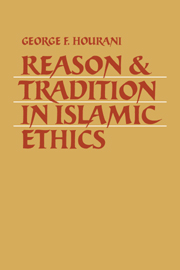Book contents
- Frontmatter
- Contents
- Preface
- Foreword by Michael Marmura
- Conventions
- Titles and locations of the original articles
- Introduction
- 1 Islamic theology and Muslim philosophy
- 2 Ethics in classical Islam: a conspectus
- 3 Ethical presuppositions of the Qurʾān
- 4 ‘Injuring oneself’ in the Qurʾān, in the light of Aristotle
- 5 Two theories of value in early Islam
- 6 Islamic and non-Islamic origin of Muʿtazilite ethical rationalism
- 7 The rationalist ethics of ʿAbd al-Jabbār
- 8 Deliberation in Aristotle and ʿAbd al-Jabbār
- 9 Ashʿarī
- 10 Juwaynī's criticisms of Muʿtazilite ethics
- 11 Ghazālī on the ethics of action
- 12 Reason and revelation in Ibn Ḥazm's ethical thought
- 13 The basis of authority of consensus in Sunnite Islam
- 14 Ibn Sīnā's ‘Essay on the secret of destiny’
- 15 Averroes on good and evil
- 16 Combinations of reason and tradition in Islamic ethics
- Select bibliography
- Index
2 - Ethics in classical Islam: a conspectus
Published online by Cambridge University Press: 13 October 2009
- Frontmatter
- Contents
- Preface
- Foreword by Michael Marmura
- Conventions
- Titles and locations of the original articles
- Introduction
- 1 Islamic theology and Muslim philosophy
- 2 Ethics in classical Islam: a conspectus
- 3 Ethical presuppositions of the Qurʾān
- 4 ‘Injuring oneself’ in the Qurʾān, in the light of Aristotle
- 5 Two theories of value in early Islam
- 6 Islamic and non-Islamic origin of Muʿtazilite ethical rationalism
- 7 The rationalist ethics of ʿAbd al-Jabbār
- 8 Deliberation in Aristotle and ʿAbd al-Jabbār
- 9 Ashʿarī
- 10 Juwaynī's criticisms of Muʿtazilite ethics
- 11 Ghazālī on the ethics of action
- 12 Reason and revelation in Ibn Ḥazm's ethical thought
- 13 The basis of authority of consensus in Sunnite Islam
- 14 Ibn Sīnā's ‘Essay on the secret of destiny’
- 15 Averroes on good and evil
- 16 Combinations of reason and tradition in Islamic ethics
- Select bibliography
- Index
Summary
The aim of this paper is to present a general review of one theme of Islamic ethical thought that should be of significance and interest to modern philosophers: analytical discussions of the meanings of ethical terms, together with some background information on normative ethics which provide the basis for the evolution of analytical ethics. Two other topics of contemporary interest were also discussed extensively by Muslim thinkers, the psychology of moral action and the question of moral freedom, but I shall leave these aside and concentrate on the first topic.
I shall start with a simplified classification of types of ethical writing in classical Islam, which will provide a frame of reference for the types we are interested in. Two levels of generality in ethical thinking have already been mentioned, ‘normative’ and ‘analytical’. (I should have liked to call the latter ‘philosophical’, but as we shall see there is a theological theory which is consciously antiphilosophical, though just as general.) There are also two traditions of ethical thinking, which we can call ‘secular’ and ‘religious’, according to their conceptions of the proper sources of ethical knowledge. Thus we can derive a fourfold scheme of types of writing on ethics: (A) Normative religious ethics. (B) Normative secular ethics. (C) Ethical analysis in the religious tradition. (D) Ethical analysis by philosophers. I am going to review A, B and D rapidly, and to concentrate on C, where it seems to me that the most interesting thought is to be found.
- Type
- Chapter
- Information
- Reason and Tradition in Islamic Ethics , pp. 15 - 22Publisher: Cambridge University PressPrint publication year: 1985
- 2
- Cited by



